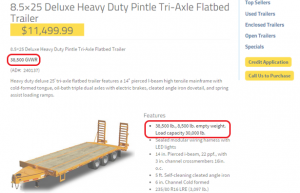GVW & GVWR: Trailer Weight, Payload Capacity & more
Learn about payload, trailer weight, the Gross Vehicle Weight Rating (GVWR), how to calculate the Gross Vehicle Weight (GVW), and why it matters.
Last Updated: August 18, 2021
One of the most common questions we get is about trailer Gross Vehicle Weight Rating (GVWR), Gross Vehicle Weight (GVW), and payload capacity. Pro-Line Trailers carries a wide variety of open and enclosed trailers for hauling cars, motorcycles, heavy equipment, and more. But not all trailers are made equal. Some trailers can safely transport 1,000 lbs., while others can handle 10,000 lbs. with ease. It’s important to understand what these weight ratings are and how to calculate GVWR.
When buying a trailer, you’ll need to consider the weight of what you’re hauling (the payload), in addition to the empty weight or “curb weight” of the trailer. Curb weight is how much the trailer weighs when it is empty. This can vary depending on the features, accessories, or custom options on your trailer.
The terms explained in this article include: GVW, GVWR, Payload Capacity, Towing Capacity, and Empty Weight (Curb Weight).
What is GVW?
GVW stands for Gross Vehicle Weight. This is the total amount of weight your trailer will weigh with your cargo included.
What is GVWR?
GVWR is one of the most important factors to consider when purchasing a new or used trailer.
GVWR or Gross Vehicle Weight Rating is what the trailer manufacturer has determined as being the maximum weight that the trailer can safely be towed at.
What’s the difference between GVWR and GVW?
The gross vehicle weight rating (GVWR) is the maximum amount of weight the trailer is able to safely hold and transport, as rated by the manufacturer. The gross vehicle weight (GVW) is how much the trailer and its payload weighs together. The GVW includes the weight of the trailer itself, plus its payload and anything that adds to the total weight.
GVW = the total weight (the weight of the empty trailer + the cargo you’re hauling + any accessories, spare tires, etc.).
GVWR = the maximum weight a trailer can safely transport, as determined by the trailer manufacturer.
What’s the difference between GVW and Payload Capacity?
A trailer’s GVW is not how much it can haul, or its “payload capacity”.
Payload capacity is the maximum weight that a trailer can safely haul.
Payload capacity = (GVW) – (Trailer weight)
Towing capacity is the maximum weight that a vehicle can pull.
To find out what your vehicle is rated to tow, head over to the NADA website, put in your vehicle information, and check out the results.
What is the GVWR of a trailer?
Before purchasing a trailer, it’s essential to determine the total weight of everything you plan to haul in it, keeping in mind the additional weight of any options or accessories.
While two trailers of the same size can weigh the same, they may each have a different GVWR and not able to haul the same payload. This is why it’s important to consider the GVWR when buying a trailer, and not just how much the trailer weighs.
Look for a trailer with a GVWR that’s greater than the weight of what you will be hauling. Typically, the higher the GVWR is, the heavier duty the trailer is.
How GVW is Calculated
At Pro-Line Trailers, we list the GVWR in the product description to make the number-crunching process easier for our customers.

For example, if a heavy duty flatbed trailer has a GVW of 38,500, this does not mean that you can haul 38,500 lbs.
To find the available payload capacity, subtract the weight of the trailer (8,500 lbs) from the GVW (38,500 lbs).
38,500 (GVW) – 8,500 (Trailer weight) = 30,000 lbs (Payload capacity)
Why It Matters: GVW Laws & Safety
In the United States there are GVWR laws that vary from state to state. Gross Vehicle Weight laws are all in place for safety reasons, as well as to help limit the damage to roads and highways from overloaded vehicles.
Keeping your vehicle and trailer under the recommended GVWR will not only help you to avoid fines and penalties. It will also keep keep you, your payload, and other vehicles on the road safe. If the weight of your vehicle exceeds the GVWR, it will decrease the stability of the ride, make braking more difficult, and cause the trailer to sway. Exceeding the maximum weight rating can also cause extra wear and tear or damage to your trailer.
Find a Trailer With The Right GVW
We can help you find the right trailer with the appropriate GVW to keep you and your cargo safe. Pro-Line Trailers carries trailers with GVWRs of all ranges, from 10,000 GVW, 14,000 GVW, to 35,000 GVW. The biggest input the customer can initially figure out is the total weight of car, tools, and goods etc. to help figure out which trailer will best suit your needs.
Let us help you determine what your payload needs are. Browse our large variety of trailers with listed GVW or give us a call at (540) 334-4182.





